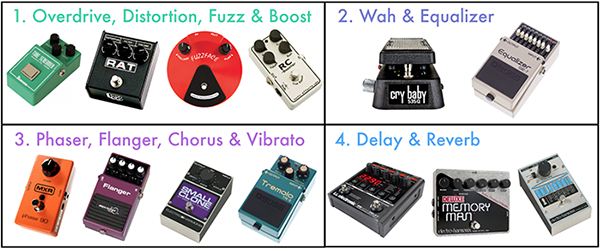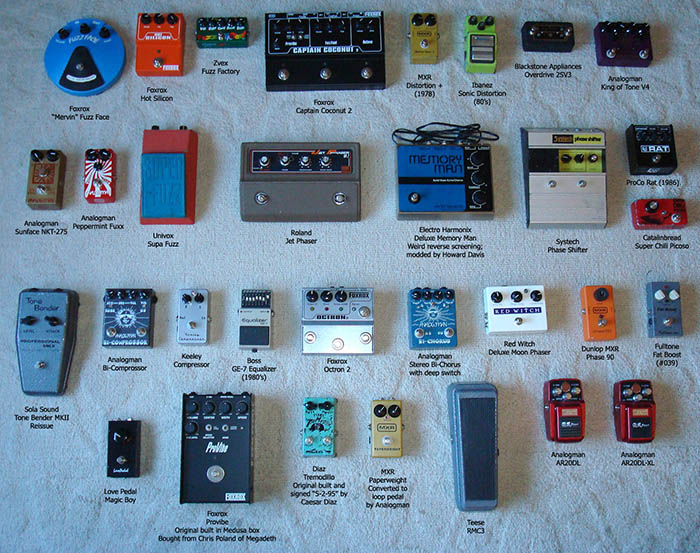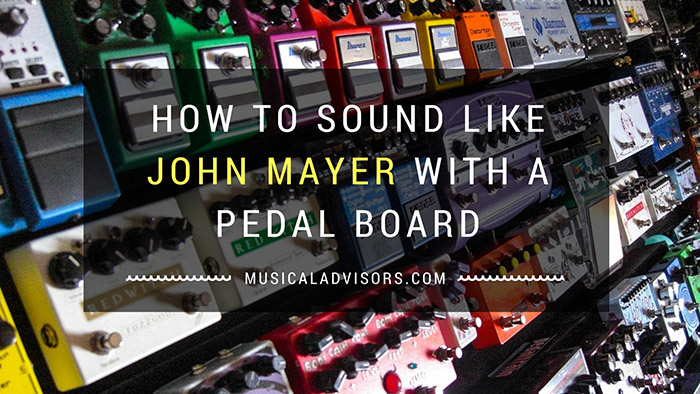How to Sound Like John Mayer with a Pedal Board
Featured image source: www.youtube.com
It’s a lot of guitarists’ dreams to sound as remarkable as John Mayer does on their instrument. Have you tried to achieve the same sound quality as Mayer, only to have fallen short? It may be because of the lack of technology that you’re using. John Mayer uses a variety of different kinds of pedals in his music.
If you incorporate the same pedals into your playing, you’ll be amazed at how much more similar your sound will be to Mayer’s. Pedals can take you one step closer to sounding unforgettable, so let’s take a look at some pedals to create a John Mayer pedalboard.

John Mayer - Source: wall.alphacoders.com

Source: www.uberchord.com
The Pedals
John Mayer uses a really complex pedalboard, but if you’re willing to invest in a few key pedals, you’ll be that much closer to creating a similarly unforgettable sound. Let’s take a look at the John Mayer pedalboard Dead and Company is so well known for.
1. Distortion Pedals
Wah Pedals
Wah pedals are great because of their ability to mimic the human voice. These pedals work well in rock, pop rock, and jazz styles of music. Like a lot of guitarists, John Mayer is always trying out new pedals, but the Real McCoy Custom RMC8 pedal has become known as the John Mayer wah pedal.
This pedal is known for its lush and smooth sound quality. In a pedal chain, you can put wah pedals before or after your other distortion pedals. When you put wah pedals before, expect a more subtle sound.
When you put wah pedals after distortion pedals, you can expect a dramatic sound.
You can find this pedal here.
Fuzz Pedals
Fuzz pedals do exactly what their name suggests: they distort your audio signal and create a fuzz sound that is really characteristic of classic rock music. John Mayer uses the Electro-Harmonix Micro Synthesizer on his pedal board, which is known for its intricate settings.
This pedal is expensive, so be prepared to invest. However, the fact that John Mayer uses this pedal reinforces its high quality. Mayer’s music isn’t too distorted, so stick to the mid-range settings of this pedal to create the right sound.
You can purchase this model here.

Source: www.mylespaul.com
2. Overdrive Pedals
John Mayer is big on effect pedals, so you’ll need to learn about a few different types if you want to create a tone that mimics Mayer’s. John Mayer is known for his use of overdrive pedals.
Overdrive pedals produce distorted sounds because the sound is overdriven to exceed the threshold of the device. The smooth signal that goes into the device is then clipped, which causes the distortion.
The most well-known overdrive pedal on John Mayer’s pedalboard is the TubeScreamer. The Ibanez TubeScreamer is loved by blues players everywhere, so it’s no surprise John Mayer has incorporated it into his pedalboard.
John Mayer Tube Screamer settings don’t involve turning the overdrive knob up too high. Mayer himself has explained that the overdrive knob is like a cheat knob, and if you cheat too much, you’ll lose the natural tones of your instrument.
You can purchase the TubeScreamer here.
3. Boost Pedals
Boost pedals are great for giving your sound some extra volume without artifact. If you plan on using a compressor pedal, a boost pedal will raise the volume back up to a regular level, as compressor pedals will often produce a more subdued output signal.
The Keeley Katana is an excellent boost pedal used by Mayer in his performances. The settings you use with this pedal will depend on the song you’re playing, and how much you want your guitar to stand out.
In Mayer’s “Slow Dancing in a Burning Room” there is a guitar solo that you’ll want to make sure stands out if you’re covering this song. For passages like this, be sure to use the higher settings of the Keeley Katana.
If you want to purchase the Keeley Katana, follow this link.
In Conclusion
Hopefully, you found this article on John Mayer signature guitar pedalboards useful. Using pedals can take your music to the next level, especially when you create a chain. Remember to put your compressor pedal first, then your overdrive and distortion pedals, followed by your modulation pedals. Leave a comment if you have any questions!

